- Home
- Graham Hancock
War God Page 8
War God Read online
Page 8
Muñoz drew his foot back. ‘What are you gawping at?’ he barked.
‘You, Father,’ said Pepillo. ‘You’re my master then?’
‘So it seems. Though I must confess I don’t see the point of a runt like you.’
‘I can read, Father, I can clerk, I can keep numbers—’
‘Splendid … splendid … But can you carry bags?’ Muñoz had moved round behind Pepillo and now kicked him low in the back. ‘Well, can you? It doesn’t look like you can. And if you can’t even carry bags, then what use are you to me?’
Although his tongue bled where he’d bitten down on it, Pepillo felt stubbornly proud that he hadn’t cried out. He rolled onto his stomach, slowly, laboriously, got to his feet and picked up both bags.
He could do this.
He shuffled his left foot forward, then his right, felt the bag bang into his shin. Left, right, bang, he did it again. He picked up the pace, blinked his eyes and focussed on the distant pier. He thought he could see the booms and derricks around the Santa María and the high sides of the San Sebastián. The ships were still far away, but not impossibly far. If he could just keep putting one foot in front of the other, he would get there in the end.
Without warning, Muñoz unleashed another kick. This time the foot in its heavy sandal connected with Pepillo’s buttocks like a blow from a sledgehammer, lifted him bodily off the ground and sent him sprawling on his face, losing his grip on both bags. He struggled to stand but Muñoz toyed with him, kicking his arms and legs from under him, making him collapse repeatedly.
‘Why are you torturing me?’ Pepillo asked.
Muñoz was all over him, straddling him, whispering in his ear. ‘You think this is torture? I’ll show you what torture is.’
‘But why?’ For an instant Pepillo’s resolve broke and he let out a strangled sob. ‘What have I done to you?’
‘You searched my bag,’ said Muñoz.
‘I didn’t! I swear!’
‘I saw you with your filthy hands in it.’
‘You’re mistaken, Father …’
A pause. Heavy breathing. ‘Swear it on the Holy Book!’
Pepillo must have hesitated because quick as a flash Muñoz rolled him on his back, reached down a long bony hand and seized him by the nostrils, applying painful, grinding pressure with his thumb and forefinger. Pepillo refused to cry out, but his eyes watered profusely and the pain got worse. He felt something twist, then break, high up near the bridge of his nose, and blood gushed down his face and filled his mouth. He spluttered, felt the blood enter his windpipe and began to cough and choke. How silly! He was drowning in his own blood! He struggled to turn his head to the side, wanting the stream to flow out of his body and into the ground, but Muñoz still held him fast by the nose and glared down at him with the light of madness dancing in his eyes.
Pepillo gagged and spluttered, but it hurt to struggle and anyway there was no strength left in his body. His sight grew blurred, a tremendous weariness stole over him and a great ringing filled his ears.
Chapter Twelve
Tlascala, Thursday 18 February 1519
When Shikotenka propelled himself out of the crevice he was ready for anything, his knife back in his hand and a snarl on his lips. To be sure, it had been agreed this was to be a matter of honour between knights, but he still half expected to be bludgeoned into unconsciousness. He’d long since learned the bitter lesson that any treachery was possible when dealing with the Mexica.
But Guatemoc hadn’t betrayed him. Draped in a shimmering cloak of turquoise cotinga feathers, the prince was strolling up the hill and singing, passably enough if somewhat out of tune, the lyrics of ‘I Say This’.
The song was well chosen. As famous amongst the Mexica as it was amongst the Tlascalans, it had been composed by Shikotenka’s ancient father Shikotenka the Elder and it contained an embarrassing reference to Shikotenka himself, which Guatemoc now recited: ‘My young son, you leader of men, a precious creature.’
Guatemoc looked back over his shoulder and gave Shikotenka a mocking smile. ‘Behold,’ he said, ‘the precious creature has emerged from its burrow. Creep in my tracks if you wish, oh leader of men, the long grass will hide you.’
Guatemoc was a head taller than Shikotenka, broader in the shoulder, heavier through the body and about five years younger, perhaps twenty-seven to Shikotenka’s thirty-three. He wore a mahogany helmet, painted gold, in the form of an eagle’s head. The jutting beak framed his handsome face, which was also eagle-like with a hooked nose and cruel mouth and bright, predatory eyes. His black hair tumbled down over his shoulders from beneath his helmet. In his right hand, held loosely, almost carelessly, was a long spear with a leaf-shaped obsidian blade. Strapped to his back, lodged inside a leather scabbard with only its handle protruding above the collar of his cloak, was his macuahuitl, the obsidian-edged broadsword used both by Mexica and Tlascalan knights as their primary battle weapon. Shikotenka had come here to spy, not to fight, and for that reason was without his sword, but he didn’t worry unduly about the imbalance. The macuahuitl was an instrument for killing and dismembering opponents. If Guatemoc opted to use it he would be unlikely to end the fight with a live prisoner to offer to Hummingbird.
Shikotenka put his knife back between his teeth again and snaked silently on his belly through the tall, feathery grass that covered much of the hillside. It was a manoeuvre he had practised in a thousand training sessions, so it was an easy matter to circle past the Mexica prince and get ahead of him.
When Guatemoc reached the hollow, Shikotenka was already there.
‘I’m not going to ask you how you did that,’ said Guatemoc. He stood at the edge of the grassy circle in the bottom of the hollow, ten paces from Shikotenka.
‘Put it down to my superior military training.’
‘If Tlascalan military training is in any way superior, then why do we Mexica so often defeat you in battle?’
‘I’d say it’s because you breed like rabbits and outnumber us ten to one,’ said Shikotenka. ‘On the rare occasions when it’s a fair fight with equal numbers, we Tlascalans always win.’
Guatemoc smiled but there was no humour in it. ‘I see one Mexica and one Tlascalan here,’ he said, ‘so let’s put your theory to the test.’ He removed his helmet and placed it on the ground, set down his spear and cast off his shimmering turquoise cloak. As well as his great advantage of height, Guatemoc had the broad, muscular chest, narrow waist and powerful sculpted legs of an athlete. He wore no armour, only a simple white loincloth and battle sandals. ‘We’re even dressed the same,’ he observed. ‘What could be fairer than that?’
‘You still have your macuahuitl,’ Shikotenka pointed out.
‘Ah yes. Of course.’ Guatemoc shook off the leather shoulder straps that held the scabbard to his back and laid the weapon down on the grass. In the same smooth movement he snatched a long, double-edged flint dagger from its sheath at his waist. ‘Knife to knife then,’ he said.
‘Knife to knife,’ said Shikotenka. He raised his own double-edged blade in a mock salute. ‘But will you tell me something first?’ he asked. ‘Something I’m curious about …’
‘By all means.’
‘How did you find me? I chose that crevice carefully. I was well hidden inside it. You shouldn’t have been able to see me there …’
‘Do you have a sweetheart?’ Guatemoc asked.
‘What?’ said Shikotenka. He couldn’t understand the sudden change of subject.
‘A sweetheart. Do you have one?’
‘You’re talking about a woman?’
‘Yes. Or a man if you’re that way inclined. A sweetheart. Someone who loves you.’
‘Well yes. I do …’
‘Girl? Boy?’
Shikotenka laughed. ‘Girl.’
‘And her name?’
‘Zilonen.’
‘Beautiful name. She’s the one that gave you to me …’
Shikotenka perceived an insult and hi
s blood instantly boiled, but Guatemoc held up an appeasing hand: ‘Don’t worry, that’s not what I mean!’
‘What do you mean?’
‘I’m picturing a tender moment. After a night of passion Shikotenka and Zilonen are saying their goodbyes. Shikotenka is a daring sort of fellow and he’s off on a dangerous mission to spy on the Mexica. Zilonen says, “Wear this charm for me, my love”, and gives him a silver amulet she has worn since childhood. She weaves it into Shikotenka’s hair. “It will keep you safe” she says.’
Shikotenka’s hand went to his long braided hair. He’d forgotten about the little amulet, but it was still there, still intact, still shiny, exactly where his wife Zilonen had placed it. He’d been a fool not to remove it immediately, but he’d felt sentimental about it. Now he saw how it had put his life in danger. ‘It was reflecting the sunlight,’ he said.
‘Like a signal.’
‘Really elementary mistake on my part,’ admitted Shikotenka.
‘That’s how I found you,’ said Guatemoc. And while he was still speaking, giving no hint or warning of his intent, without even a change of facial expression, he launched himself at Shikotenka across the ten paces that separated them, his dagger gripped point-down in his right fist, its long blade hissing through the air in a blur of criss-crossing diagonal slashes.
Shikotenka was unimpressed. He’d survived enough knife fights to know that speed, strength and technique were all very well, but what really counted was having the sheer malicious will to do as much harm as possible to your enemy. By all accounts Guatemoc was brave and cruel in battle, but Shikotenka knew there were limits to the damage he would want to do today when his overriding concern must be to win honour by bringing in a high-ranking living captive for sacrifice.
Shikotenka had no such distractions. He would not take Guatemoc prisoner. His only interest, the entire focus of his will, was to kill him now, quickly and silently, and continue with his mission. So he weaved and ducked before the furious assault, keeping his own knife hand back, not yet committing himself to a counterattack, waiting for the right moment.
‘It must be difficult for you,’ he said conversationally as they circled.
Guatemoc blinked: ‘Difficult? What?’
‘To be the most accomplished warrior in Coaxoch’s army and yet see his windbag sons raised above you as regiment generals.’
‘They’re welcome to the job,’ laughed Guatemoc. ‘I fight for honour not position, and I take my orders only from our Speaker.’
‘Oh yes, of course, your uncle! But tell me – as a brave Mexica, how can you possibly endure the leadership of that stuffed tunic? Why even Coaxoch is a better man than him!’
‘Moctezuma is the greatest Speaker ever to lead the Mexica nation.’
‘Come off it, Guatemoc! You don’t really believe that, do you? The man’s an arse. I know he’s an arse. You know he’s an arse. Why not just admit it?’
‘He’s a great man.’
‘He’s an arse. He’s going to put you all in the shit if you don’t get rid of him soon. That’s what arses do.’
‘I’ll not hear your filthy insults against my Speaker!’ Guatemoc feinted as though about to strike upward and predictably stabbed down, aiming to disable Shikotenka with a wound to the thigh.
Shikotenka danced away from the blade. ‘Perhaps the rumour about the Lady Achautli is true?’ he suggested. He made the face of a man who has tasted something sour. ‘It would explain your insane loyalty.’
‘You dare speak of my mother!’
‘Not I, Guatemoc, not I, but every gossip on every street corner, every merchant, every fruit-seller, every masturbating schoolboy speaks of your mother – and of your mother’s loins …’
A thunderous look had settled over Guatemoc’s brow. ‘You go too far!’ he warned.
‘Apparently those loins of hers were famously loose—’
‘Too far!’ Guatemoc roared, and lashed out with his knife – a curling right hook that whistled past Shikotenka’s neck, missing him by the breadth of a finger.
Shikotenka danced away another few paces. He could feel the joy of battle rising in him. ‘Apparently,’ he said, ‘the Lady Achautli wasn’t just bedding your father Cuitláhuac – that poor cuckold! – when you were conceived. The hot little hussy was also bedding his brother Moctezuma. Five times a day I’m told, when she could get it. So no wonder you’re loyal to him! He’s not just your uncle, he’s your father as well!’
As Guatemoc charged, making strangled, choking sounds, drawing his dagger up into a brutal overhead strike, time seemed to slow for Shikotenka, and muscle memory from many battles took over. He slid his left foot forward, punched his blade into his opponent’s exposed flank, scraped it across his ribs and swung it up to parry his strike.
The knives clashed and locked a span above Shikotenka’s head, and the two men strained against each other, muscles knotted, grunting like animals. Shikotenka found himself close enough to Guatemoc to see the mad cruel Mexica arrogance in his eyes and smell the distinctive metallic reek of human blood on his breath. Which of my brothers? he thought. Which of my sisters?
Knife fighting was all about deception, so Shikotenka allowed Guatemoc to use his superior height and weight to bear down on the fulcrum of the two blades, wanting him to focus his mind there. He waited … waited … until he felt the point of balance shift, then abruptly swept his own blade clear, letting the big man’s momentum carry him forward and down. Guatemoc rolled as he hit the ground, bounded back to his feet and came circling in again, but he was slower than before, blood was streaming from the wound in his side and he seemed to notice the injury for the first time.
Did he still seriously imagine he was going to take a captive here?
Guatemoc lunged and Shikotenka blocked, slid his left leg forward, trapped Guatemoc’s right knee behind his left knee, sliced the blade of his knife thrice through the soft flesh of Guatemoc’s right forearm to disable his knife hand and in a flurry of activity stabbed him in the chest and throat five times in rapid succession – Tac! Tac! Tac! Tac! Tac!
In an instant the bottom of the hollow had become a butcher’s shambles and Guatemoc was on his back on the grass.
A bright bubble of blood at the corner of his mouth, the faint rise and fall of his chest and the pulse of the big artery in his neck – miraculously still intact – were evidence that life still clung to his body.
Shikotenka stooped, knife in hand, whispering a brief prayer of gratitude that his enemy’s heart still beat. Ilamatecuhtli, aged goddess of the earth and death, required no temple or idol and would surely be pleased to receive such an exalted offering.
True the victim was no longer in perfect physical condition …
But while he lived he could be sacrificed.
Like the helpless Tlascalans sacrificed this morning. The smell of their blood still lingered on Guatemoc’s failing breath.
Cold, implacable rage seized Shikotenka as he remembered the slaughter and his impotence as he witnessed it. He positioned himself to split the prince’s breastbone, raised his knife and was about to make the first deep incision when a wet, choking rattle rose in Guatemoc’s throat, a great convulsion shook his body and his heels drummed out a furious tattoo on the ground. Blood spewed from his mouth and, with a final hideous groan, his breathing ceased, the pulse of the artery in his neck slowed and stopped and the spirit left him.
Unbelievable! Even in defeat the strutting Mexica had found a way to escape the rightful vengeance of Tlascala! It would have been justice to tear his palpitating heart from his chest, but now it was too late.
One could not meaningfully sacrifice the dead.
Keeping his knife in his fist, Shikotenka dropped to his haunches while he decided what to do. The thought occurred to him that he might cut out Guatemoc’s heart anyway and leave it on the grass beside his corpse. It would send a potent message to Moctezuma of Tlascalan contempt. There was a risk the body would be found in the coming
hours, putting the Mexica army on high alert with potentially disastrous consequences for tonight’s raid, but that risk would be there whatever Shikotenka did. With so much blood about already it would be pointless to try to hide the body, so he might as well have the pleasure of inflicting this final humiliation upon it.
Again he raised his knife, and again lowered it.
The problem was he found no pleasure at all in the prospect of further humiliating Guatemoc.
Quite the opposite.
As he looked down at the still, broken corpse of the prince, his handsome face peaceful and almost boyish in death, Shikotenka realised that what he felt was …
This could be my brother.
This could be my friend.
To be sure, Guatemoc was Mexica, and belonged to the family of the hated Speaker. That was his birth. That was his fate. But he had also shown courage, chivalry, intelligence and ingenuity and had been, in his own way, amusing.
He’d not been as good a knife fighter as he’d imagined, though.
With a grunt of displeasure, Shikotenka stood, cast around and snatched up Guatemoc’s macuahuitl from where it lay nearby. He strapped it to his back, strode to the rim of the hollow, dropped on his belly and began to crawl furiously through the long grass towards the top of the hill a few bowshots above.
Dust filled his nostrils as he snaked upward. He passed through further hollows and gullies that hid him completely from view, but there were other stretches where the cover was thin and he felt dangerously exposed.

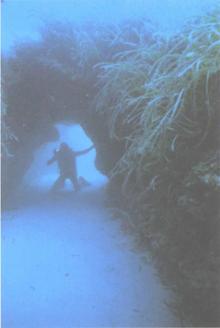 Underworld: The Mysterious Origins of Civilization
Underworld: The Mysterious Origins of Civilization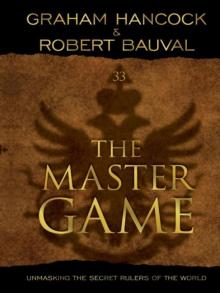 The Master Game: Unmasking the Secret Rulers of the World
The Master Game: Unmasking the Secret Rulers of the World America Before
America Before Entangled
Entangled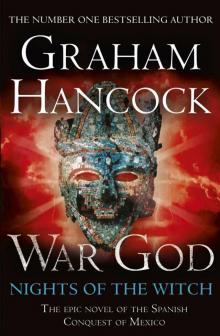 War God: Nights of the Witch
War God: Nights of the Witch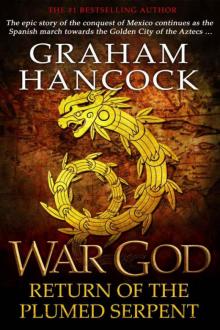 War God: Return of the Plumed Serpent
War God: Return of the Plumed Serpent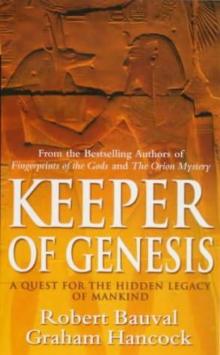 The Message of the Sphinx AKA Keeper of Genesis
The Message of the Sphinx AKA Keeper of Genesis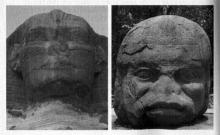 Fingerprints of the Gods
Fingerprints of the Gods The Sign and the Seal
The Sign and the Seal The Mars Mystery: The Secret Connection Between Earth and the Red Planet
The Mars Mystery: The Secret Connection Between Earth and the Red Planet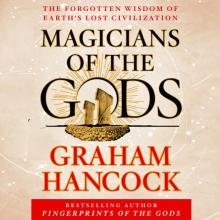 Magicians of the Gods: The Forgotten Wisdom of Earth's Lost Civilization
Magicians of the Gods: The Forgotten Wisdom of Earth's Lost Civilization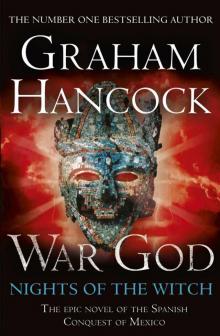 War God
War God Underworld
Underworld The Mars Mystery
The Mars Mystery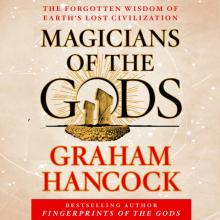 Magicians of the Gods
Magicians of the Gods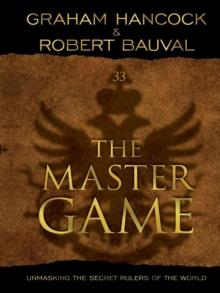 The Master Game
The Master Game